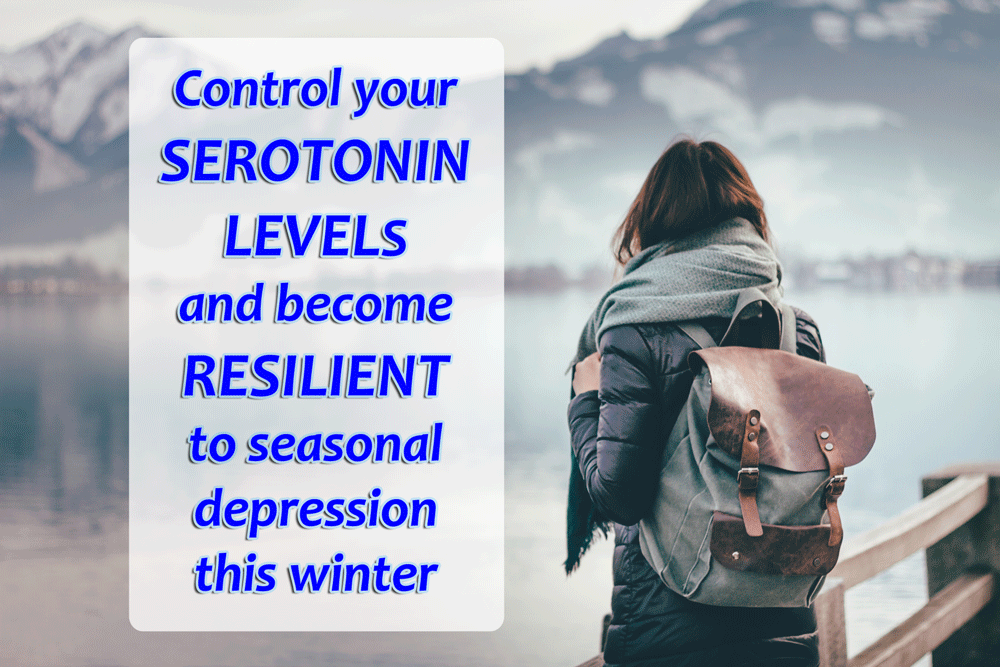Control your serotonin levels and become resilient to seasonal depression this winter

One minute the sun is shining at the hot beach, the next minute you’re stoked for the leaves to change colors and the slightly cooler weather to roll in. Fast forward another month, and there you are sitting at home wallowing in the dark, your energy levels at an ultimate low and nothing can convince you to leave the house.
Yep, seasonal depression, or seasonal affective disorder (SAD) as they call it, is a real thing, for many many people.
In fact, the National Institute of Mental Health says five percent of the population in the U.S. suffer from SAD to some degree—and many more suffer from a milder form of SAD generally referred to as the Winter Blues—and 80 percent of those who do are women.
This has led to a theory that women are genetically predisposed to SAD. Research has also shown that the Benefits of Mindfulness can encompass SAD and help them prevent ward away blues.
Being genetically predisposed to depression isn’t a radical new thought.
Past research, for example, tells us those who carry a gene called 5-HTTLPR are more likely to develop depression and SAD.
This gene essentially plays a role in regulating how effectively serotonin—the happiness neurotransmitter—gets removed from the brain. Those with the gene = more likely to become depressed or develop SAD.
Whether you’re genetically predisposed or not, anyone can become a victim to SAD—or at the very least anyone can be affected by the winter blues—as SAD simply stems from insufficient sunlight.
This, of course, means the condition is generally worse in places around the world where months go by with days with little to no sunshine.
Hormonally speaking, more daylight stops serotonin from being removed from the brain. Thus, sunshine sort of acts as a natural anti-depressant.
Without enough of it, your serotonin levels can push you to become SAD. Read more about serotonin and how it affects your mood here: (https://www.healthline.com/health/mental-health/serotonin#mental-health).
Back to the genetic predisposition for a minute…
Being genetically predisposed to SAD was the impetus behind a recent Danish study published in the Journal European Neuropsychopharmacology (https://www.europeanneuropsychopharmacology.com/article/S0924-977X(18)30164-0/fulltext).
The research team sought to discover why some people, though they carry the 5-HTTLPR gene, manage to become resilient to SAD and depression.
The research is pretty fascinating:
The study looked at 23 participants who have not experienced depression but who carry the 5-HTTLPR gene. It then looked at their serotonin levels in both the summer and the winter months.
Generally, serotonin levels are higher in the summer and lower in the winter (about 10 percent higher) but the participants in the study—who were all allegedly susceptible to SAD because of their 5-HTTLPR gene—were able to control their serotonin levels, so their levels of serotonin remained the same during all seasons, making them essentially naturally SAD-resilient!
Obviously, this study is a super small stud with only 23 participants, but the researchers are hopeful this can lead to new research about ways to control and prevent people from developing SAD and other forms of depression.
Until then, here are some practical ways to ensure you don’t become SAD this winter:
Keep Gymmin:
Though we might be admittedly biased, there’s tons of evidence—including a study from the Cochrane Review that reviewed 30 other clinical studies—suggesting exercise improves symptoms of depression, including those associated with SAD.
Basically, working out helps stabilize your mood. Bonus if you can get outside for walks or runs or hikes even in the colder months, as you will probably benefit even more from at least a little bit of natural sunlight during the shorter days of winter. Or…start skiing this winter!
Don’t give in to the carb cravings:
It’s natural for a person who is depressed to have cravings for carbohydrates because they promote serotonin production, but as you know refined carbohydrates cause more damage than good—sugar spike leads to a sugar crash, obesity, Type 2 Diabetes, heart disease and on and on.
So keep on selecting whole, unprocessed foods to keep your body functioning well.
Fish Oil:
Some science has linked SAD and other forms of depression to Omega-3 deficiencies. Omega-3 fatty acids seem to help serotonin pass through cell membranes more effectively.
So if you’re not already doing so, consider taking a fish oil supplement this winter. Read more about the importance of fish oil in a recent piece we posted HERE.
Vitamin D:
Same goes for Vitamin D—the sunshine vitamin. If you’re not already taking vitamin D, do it! Especially in the winter.
SAD-Vacation Planning:
If you know February, for example, is when seasonal depression hits you hardest, try to get away sometime in February, if life and work permits, to somewhere with reliable sunshine.
It makes more sense to go on vacation when your body really needs it than in July when there’s plenty of sunshine at home, doesn’t it?
Keep Socializing:
This might sound obvious, and maybe a little lame, but when you’re feeling down it’s easy to want to hibernate yourself when the reality is connections with other human beings is one of the most, if the not single most important thing, for our happiness.
Schedule social events in advance with people so you’re less likely to bail, to ensure you get out and get social even when you’re tempted to stay home.
Light Therapy? Tanning?
This one might be a little more “out there,” but there’s evidence that 30 minutes of light therapy can help boost energy levels.
Essentially, light therapy devices are designed to give off light that tricks you into thinking it’s real sunlight. Read more about light therapy here: (https://www.mayoclinic.org/tests-procedures/light-therapy/about/pac-20384604)
In short, there are several different types of light therapy devices—dawn simulation, portable light boxes, and battery-powered head visors to name a few. Some doctors event prescribe various forms of light therapy to their patients with SAD.
And although this one is going to be a tough sell because of the whole cancer thing, your mood is also important, too, right?
Soooooooo, an infrequent tan in a tanning bed in the winter (as long as you don’t let yourself burn) might be something else to consider. Just a thought.
Please share your best tips for staying HAPPY and avoiding SAD this winter.





